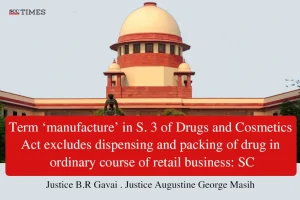Supreme Court: While considering the instant appeal challenging the decision of Andhra Pradesh High Court refusing to quash the complaint against the appellants for allegedly selling Nitrous Oxide I.P. to an unlicensed firm; the Division Bench of B.R Gavai* and Augustine George Masih, JJ., held that term ‘manufacture’ in Section 3 of Drugs and Cosmetics Act, 1940 is an inclusive term and has a wide scope. It includes any process or part of a process for making, altering, ornamenting, finishing, packing, labelling, breaking up or otherwise treating or adopting any drug or cosmetic with a view to its sale or distribution. The definition excludes the compounding or dispensing of any drug, or the packing of any drug or cosmetic, in the ordinary course of retail business.
Background:
A complaint was issued to the appellants to produce and submit the drug license to manufacture the drug Nitrous Oxide I.P. and to produce the sale bills. The representative of the appellant submitted the same. The Drug Inspector submitted the complaint that the appellant sold the drug Nitrous Oxide I.P. to an unlicensed firm in contravention of Section 18(a)(vi) of the Drugs and Cosmetics Act, 1940 read with condition of the license in Form 26, point No. 03 read with Section 65(5)(1)(b) of the Drugs and Cosmetics Rules, 1945, punishable under Section 27(d) of the 1940 Act.
The appellant approached the High Court seeking to quash criminal complaint in the Trial Court. However, the High Court dismissed the appellant’s petition.
Court’s Assessment:
Perusing the matter the Court noted that the only allegation against the appellants are that they sold Nitrous Oxide I.P. to a firm which did not have license for sale and as such, there was a violation of Rule 65(5)(1)(b) of the 1945 Rules which is punishable under Section 27(d) of the 1940 Act.
Taking note of Section 3 of the 1940 Act, which defines “manufacture”, the Court noted that the term as defined is firstly inclusive and secondly wide enough to include any process or part of process from making, altering, ornamenting, finishing, packing, labelling, breaking up or otherwise treating or adopting any drug or cosmetic with a view to its sale or distribution. What is excluded from the definition is the compounding or dispensing of any drug, or the packing of any drug or cosmetic, in the ordinary course of retail business.
Furthermore, taking note of Sections 18 and 27, the Court explained that for constituting an offence, what is necessary to establish is that the accused manufactures for sale or for distribution, or sells, or stocks or exhibits or offers for sale or distributes any drug without a valid license required under clause (a)(vi) of Section 18 of the said Act. As such, what the prosecution will have to establish is that the appellants sold the drug to accused No.3 without accused No.3 having the valid license for the further sale of the same.
Furthermore, referring to Rule 65 of the 1945 Rules, and Forms therein, the Court pointed out that clause 2 of Form 25 which is a licence issued under Rule 70 of the said Rules would reveal that it authorizes the sale by way of wholesale dealing and storage for sale by the licensee of the drugs manufactured under the licence, subject to the conditions applicable to licence for sale.
The Court noted the respondent’s contention that the licence under Form 25 is subject to Form 20B and since the firm did not have a licence under Form 20B, the sale to unlicensed firm by the appellants was in contravention of Section 18 (a)(vi) of the said Act and pointed out that as per definition of “manufacture”, the respondent’s contentions are fallacious.
The Court pointed out that since the firm and the appellant are holding the licence for manufacture, they will be entitled to carry out any process or part of process which includes altering or breaking up with a view to its further sale or distribution.
The Court further pointed out that that except recording the submissions of the complainant, no reasons are recorded for issuing the process against the accused persons. The Court reiterated that summoning of an accused in a criminal case is a serious matter. The order of the Magistrate summoning the accused must reflect that he has applied his mind to the facts of the case and the law applicable thereto. The Magistrate is required to examine the nature of allegations made in the complaint and the evidence, both oral and documentary in support thereof and as to whether that would be sufficient for proceeding against the accused; and should not become a silent spectator at the time of recording of preliminary evidence before summoning the accused.
In the instant case, the Court did not find any application of mind on behalf of the Magistrate and the High Court had misdirected itself in the matter. Therefore, the Court deemed it fit to allow the appeal and quash the impugned judgment of the High Court.
CASE DETAILS
|
Citation: Appellants : Respondents : |
Advocates who appeared in this case For Petitioner(s): For Respondent(s): |
CORAM :

